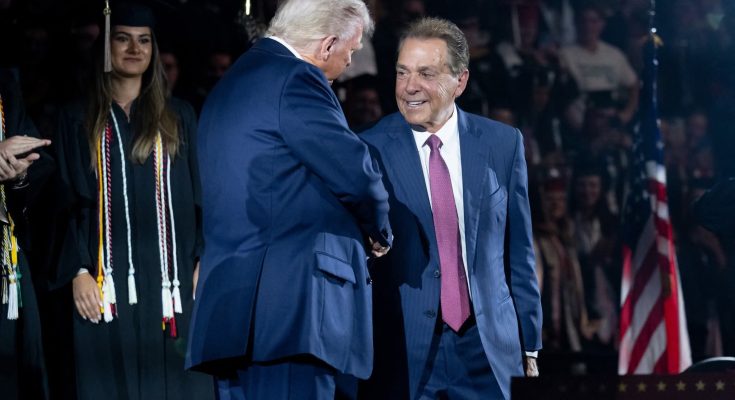Donald Trump’s recent public remarks represent a major escalation in his involvement in college athletics, as he continues pushing for Nick Saban, the legendary former Alabama coach, to play a central role in reshaping the governance of college sports. Speaking on The Pat McAfee Show on Tuesday, Trump made a forceful plea for Saban to “take a good, strong look” at leading reform efforts at a time when college sports are grappling with existential financial and structural challenges. “I’d listen to what he has to say,” Trump said, praising Saban not just for his coaching résumé but also for his insight into the collegiate sports world.
At the core of Trump’s pitch is alarm over the current trajectory of college athletics, especially the financial excesses tied to name, image, and likeness (NIL) deals and what he calls the “bidding up” of talent. Trump argued that colleges could soon face unsustainable costs: “Even rich colleges are going to go bust,” he warned, unless “very powerful caps” are imposed on athlete compensation. He drew a stark comparison to professional sports, saying some programs are already veering toward “NFL‑type payrolls.” To avert this, he floated the idea of Saban heading a task force or commission: “A guy like Nick Saban … and some others … they’re going to have to do something.”
Trump’s concern is not restricted to football powerhouses. He framed the crisis in broader terms, lamenting that many “lesser sports” are being terminated, sports that he believes have historically served as important development pipelines, even Olympic training grounds. “It’s a shame,” he said, “a lot of those training grounds are being lost.” For Trump, Saban’s deep understanding of college athletics — his decades of coaching at the highest level, his connections, his credibility — makes him uniquely qualified to help restore balance and sustainability.
Trump’s push for Saban’s involvement is not just rhetorical. Earlier this year, the White House issued a sweeping “Saving College Sports” executive order aimed at curbing dangerous trends. The order directs federal agencies — including the Department of Labor and the National Labor Relations Board — to clarify that student-athletes should not be classified as employees, thereby preserving what Trump calls the “educational model” of college sports. It also prohibits third-party “pay-for-play” arrangements designed to hide recruiting inducements, while mandating increased support for non-revenue sports. (Politico)
Saban has publicly lauded that executive order. Speaking on Fox & Friends, he called it “a huge step in providing the educational model that … we’ve always tried to promote” — development as people, as students, with professional opportunities if that’s the path they choose. (PFSN) He echoed this in other interviews, warning against a future in which universities become little more than sponsors of professional teams. (PFSN) Saban’s vision, as he articulated it, is not to eliminate NIL, but to regulate it — to remove the arms‑race dynamic and to ensure that the system does not privilege the richest programs at the expense of fairness and integrity. (HBCU Sports)
Trump’s effort to institutionalize Saban’s role may go beyond advisory capacity: reports suggest that the former coach could serve as a co-chair of a federal commission on college sports, alongside Texas businessman Cody Campbell, whose background includes leading a name, image, and likeness collective. (CBS Sports) But Saban has pushed back on the idea of a formal commission. He told reporters at his annual “Nick’s Kids” golf tournament that “I don’t think we need a commission … We know what the issues are.” (CBS Sports) He has expressed a willingness to serve in a consultant role, bringing his experience without necessarily heading a bureaucratic body. (CBS Sports)
Still, Trump appears undeterred. In his view, Saban’s involvement is not just symbolic. It’s practical. Trump repeatedly emphasized that colleges cannot continue on their current path without structural reform. “Bad things are going to happen unless they figure this out,” he said, urging “some form of payment … but … not when they start bidding up the costs.” (Yahoo Sports) He points to the need to rein in runaway spending, especially when smaller or less lucrative programs are being forced to cut sports because resources are being funneled into a small number of high-profile names and high‑stakes NIL deals.
The concern about preserving lesser and Olympic sports is not purely sentimental. According to Trump, these sports serve a broader societal and national function — not just for athletes, but for the future Olympic teams and for maintaining opportunities for a wide range of student-athletes. Without reforms, Trump warns, “they are really terminating a lot of sports … big sports, good sports … they’re getting rid of them.” (Yahoo Sports) His executive order reflects that: it requires well-funded athletic departments to increase scholarships for non-revenue sports, while ensuring that programs with fewer resources do not hollow out entirely. (Politico)
Saban’s public statements suggest he shares Trump’s concerns. He has framed the issue as a choice between two competing models: an “education-based model” that values sport as part of personal and academic development, or a model in which colleges become de facto professional sports teams. “I think most people would choose the former,” Saban said. (PFSN) He strongly supports clarifying the employment status of student-athletes, arguing that once pay-for-play deals become disguised as marketing deals, the integrity of the college model is at risk. (SI)
Nevertheless, Saban has expressed reservations about the structure Trump proposes for implementing these reforms. His resistance to a formal commission underscores a deeper tension: while he supports regulation, he seems wary of heavy-handed bureaucratic intervention. He believes that real reform will come from people willing to “move those … issues … and create some solutions,” rather than accountants or politicians. (SI) For Saban, the key is not to overcentralize power, but to leverage expertise, experience, and shared commitment to preserve what he describes as the essence of college sports.
On Trump’s end, though, Saban’s leadership is precisely what gives his reform ambitions credibility. The former president has framed the issue as existential: without Saban’s involvement and without meaningful regulation, the system could spiral out of control. He warns of colleges going “out of business” if unchecked payments continue, even among top programs. (Yahoo Sports) Trump also draws a line between scholarships and unchecked salary-like payments: “The old way … they gave scholarships … but … when they start bidding up the costs?” he asked rhetorically on McAfee’s show. (On3) He argues that some form of compensation is acceptable — but only within strong, enforceable guardrails.
Trump’s framing isn’t just economic; it’s moral and cultural. He sees college sports not just as entertainment, but as a critical institution where young people develop, learn, and mature. In his view, without reform, the educational mission of college athletics could be lost, replaced by a hyper‑commercialized, unsustainable arena dominated by elite programs and wealthy boosters.
Saban, for his part, has praised the executive order for reaffirming that college sports should not become professional leagues. (The Western Journal) He supports the restriction on third-party inducements and the reaffirmation that athletes are not employees, arguing that these steps help preserve the “uniquely American institution” of the student-athlete model. (PFSN) For Saban, restoring balance means protecting scholarship athletes, preserving opportunities in non-revenue sports, and ensuring that compensation through NIL is regulated in a way that prevents abuse. (1819 News)
Critics may question how realistic Trump’s vision is. Can federal regulation truly tame the chaotic NIL marketplace? Will boosting non-revenue sports funding come at the expense of the powerhouses? And even if Saban agrees to a role, will he have enough authority to enact meaningful change? Saban’s own ambivalence about formal institutional structures suggests he may prefer influence over title. But Trump’s insistence on having him lead signals something more than a symbolic gesture — it’s an appeal to gravitas, experience, and legacy at a moment when many fear college sports are at a breaking point.
If Saban steps in, the impact could be profound. His reputation as a disciplined, strategic thinker could lend legitimacy to reform proposals that may otherwise be dismissed as political posturing. As a trusted voice in the sport, he could bridge divides: between coaches and administrators, athletes and colleges, boosters and regulators. But even beyond that, his involvement could help re-center the conversation around what college sports are for—who they serve, and what their mission should be in the 21st century.
Trump’s push for Saban also underscores how politicized college athletics have become. Reform is no longer just a matter for the NCAA or university boards; it’s now coming from the federal government. Trump’s executive order, his talk of a commission, and his public appeals to Saban represent an unprecedented level of presidential engagement in a sector that has long been resistant to top-down control. Whether this approach succeeds may depend heavily on Saban’s willingness to collaborate, and his ability to help craft a path forward that balances financial sustainability, competitive equity, and the educational values at the heart of college sports.
At the end of the day, the drama unfolding around Trump and Saban isn’t just about money or power—it’s about the identity of college athletics itself. Can it survive as a place where student athletes learn and grow, or will it become indistinguishable from professional sports? That question drives Trump’s pitch, and it animates Saban’s cautious but earnest engagement. In calling on Saban to take more responsibility, Trump is betting on a legacy coach to help reshape the future of college sports—and perhaps to restore a model that many believe is being lost.



